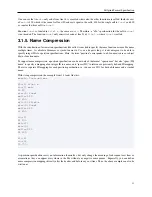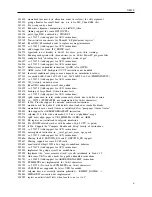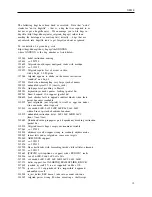
NEWS
- The leak_check GDB server monitor command now can
control the maximum nr of loss records to output.
- Reduction of memory use for applications allocating
many blocks and/or having many partially defined bytes.
- Addition of GDB server monitor command ’block_list’ that lists
the addresses/sizes of the blocks of a leak search loss record.
- Addition of GDB server monitor command ’who_points_at’ that lists
the locations pointing at a block.
- If a redzone size > 0 is given, VALGRIND_MALLOCLIKE_BLOCK now will
detect an invalid access of these redzones, by marking them
noaccess.
Similarly, if a redzone size is given for a memory
pool, VALGRIND_MEMPOOL_ALLOC will mark the redzones no access.
This still allows to find some bugs if the user has forgotten to
mark the pool superblock noaccess.
- Performance of memory leak check has been improved, especially in
cases where there are many leaked blocks and/or many suppression
rules used to suppress leak reports.
- Reduced noise (false positive) level on MacOSX 10.6/10.7, due to
more precise analysis, which is important for LLVM/Clang
generated code.
This is at the cost of somewhat reduced
performance.
Note there is no change to analysis precision or
costs on Linux targets.
* DRD:
- Added even more facilities that can help finding the cause of a data
race, namely the command-line option --ptrace-addr and the macro
DRD_STOP_TRACING_VAR(x). More information can be found in the manual.
- Fixed a subtle bug that could cause false positive data race reports.
* ==================== OTHER CHANGES ====================
* The C++ demangler has been updated so as to work well with C++
compiled by up to at least g++ 4.6.
* Tool developers can make replacement/wrapping more flexible thanks
to the new option --soname-synonyms.
This was reported above, but
in fact is very general and applies to all function
replacement/wrapping, not just to malloc-family functions.
* Round-robin scheduling of threads can be selected, using the new
option --fair-sched= yes.
Prior to this change, the pipe-based
thread serialisation mechanism (which is still the default) could
give very unfair scheduling.
--fair-sched=yes improves
responsiveness of interactive multithreaded applications, and
improves repeatability of results from the thread checkers Helgrind
4
Содержание BBV
Страница 176: ...Valgrind FAQ Release 3 8 0 10 August 2012 Copyright 2000 2012 Valgrind Developers Email valgrind valgrind org ...
Страница 177: ...Valgrind FAQ Table of Contents Valgrind Frequently Asked Questions 1 ii ...
Страница 302: ...README mips based on newer GCC versions if possible 95 ...
Страница 303: ...GNU Licenses ...
Страница 304: ...GNU Licenses Table of Contents 1 The GNU General Public License 1 2 The GNU Free Documentation License 8 ii ...
















































